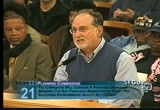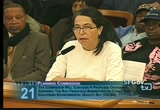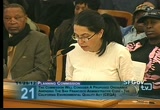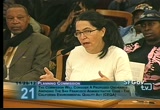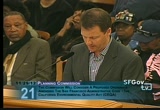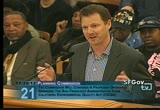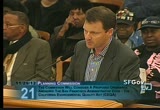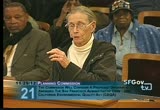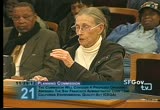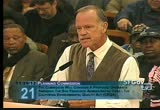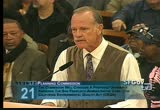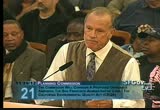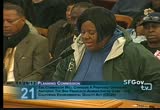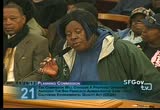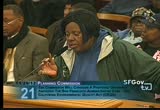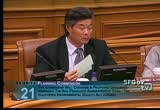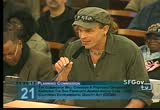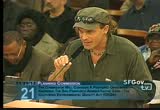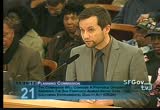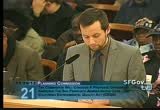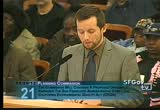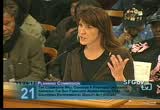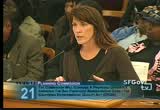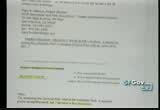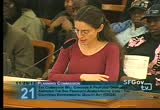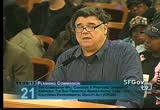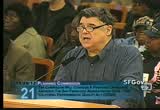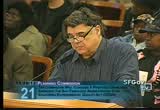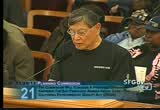tv [untitled] December 4, 2012 5:00am-5:30am PST
5:00 am
[speaker not understood]. nobody enforces c-e-q-a itself except the citizens. it is designed for the citizens to have that right. and, so, every time you abbreviate the ability or curtail the ability for citizens to actually appeal and comment on c-e-q-a documents, you are undermine the very reason that we have c-e-q-a, which is to, again, allow citizens to enforce c-e-q-a and make sure that projects are not approved that are damaging environmentally. so, we believe, many lawyers believe, you have our letter, that this is legally not valid. that where it is legally valid, it is still inappropriately restricting. i urge you to reject this. thank you. >> thank you. good afternoon, my name is rose brads. i'm with the center for biological diversity and i'm here on behalf of our thousands of members, supporters and activists in san francisco. i'm also a resident of san francisco and i'm joined in my comments today by the wild
5:01 am
equity institute. we at the center strongly support the twin purposes of c-e-q-a which are environmental protection and informed self-government. and we all know that compliance with c-e-q-a including public input has improved countless public and private projects in california over the last 40 years. it's resulted in tangible protection for endangered species and their habitats, cleaner hair and water and more efficient use of scarce public resources. although many of the proposed amendments before you today appear to be technical conforming changes, the proposal as a whole would make public participation in city decision making even more difficult. even more difficult than sitting in these hard benches for many hours as we've done in many chambers here. and we're concerned that the proposed amendments improperly subvert the important public informed self-government principles of c-e-q-a. so, first and foremost, the repeal of existing appeal
5:02 am
procedures and administrative code 31.16 and the replacement with the far more restrictive and limited provision than the proposed amendments to both raise obstacles to development decisions and narrow the scope of the board's review. other specific provisions that raise additional bars to public participation potentially conflict with state law and increase rather than reduce the city's exposure to c-e-q-a litigation and specifically i'm talking about confusing and unnecessarily complex processes for providing notice of c-e-q-a exemption determinations. under the proposed amendment, members of the public must submit written materials regarding an appeal to the board one full day before the city is required to give notice of the appeal. in other words, you have to give your written materials are due before member of the public are informed that an appeal is happening. the proposed amendments would deem valid prior c-e-q-a approval actions which could force project appellants to file lawsuits even before the
5:03 am
board reaches decisions on their appeals in order to avoid c-e-q-a's strict statute of limitations. this could subject the city to additional and unnecessary expensive litigation. and finally, the proposed amendments would force members of the public to file two appeals and pay two appeal fees of $500 each in order to seek review proposed negative declarations before the board of supervisors. i also want to conclude by noting that this move comes in the context of a tax on the epa, couldn't clean air pact, clean water act endangered species act and [speaker not understood] law here in california c-e-q-a. and the hope the city of san francisco would be rather than looking at making c-e-q-a and public participation more limited, looking at ways in which to defend our hallmark [speaker not understood]. thank you. president fong, commissioners, matt reagan with the bay area council.
5:04 am
we're a business sponsored public policy advocacy organization. we do a lot of research on the health of the region's economy. one of the key factors we have constantly come to our attention is that the qualitiv of our environment here in the bay area is key, is a very key factor to maintaining our economic health and vitality. we need strong economic -- sorry, environmental protections and regulations. we have come to the conclusion that c-e-q-a provides none of that. c-e-q-a is a law that is for all intents and purposes obsolete. some of the people who spoke before me mentioned that many, many federal and state statutes that have been passed since c-e-q-a was written into law in 1970, that duplicate what c-e-q-a does. all of c-e-q-a currently does is absent those additional protections is put in place a very lengthy process for review and a very low threshold for litigation.
5:05 am
that low threshold for litigation invites bad players into the process. if you look at who sues projects and who tries to stop projects, three main constituencies, the environmental community is not one of them. the labor community sues projects for project labor agreements, to try and leverage those agreements from project sponsors. not so long ago i was downstairs at the hearing for the cathedral hill hospital where the california nurses association had their c-e-q-a attorney to challenge the e-i-r, obviously an attempt to leverage influence in contract negotiations, nothing to do with environmental benefits. wendy's, people who don't want lower income housing in their neighborhoods or people of color in the neighborhood, booker t. washington center was mentioned earlier. and the business community, we're as guilty as anyone else. we have k-mart suing wal-mart to stop any type of economic competition. all under the guise of environmental protection. the end result of all of this
5:06 am
litigation and needless delay -- a detriment to our environmental well-being. development follows the path of least resistance. when you have litigation in urban areas where you have a lot of people and people don't like people, that development horizontally sprawls right into suburban areas and you get horizontal development, transit -- rather auto dependent development which is not good for our vieerthv. environment. you are being asked today to institute a fair process so so that honest brokers can challenge battered projects while protecting good projects from the bad players whose motives have nothing to do with environmental protection. to finish, i'm party to the negotiations with senator rubio in the state capital working on c-e-q-a reform hopefully next year. what you are being asked to do today is a process to hasten the c-e-q-a [speaker not understood] will not be addressed as part of that process. what you're doing is important
5:07 am
and it will have meaningful impact. thank you. >> thank you. good afternoon, commissioners. my name is joan wood. i live in north beach. i'm a native san franciscan, third generation, actually. it was interesting that supervisor wiener seemed to be revealing that the main thing that has sent him into this litigation is the north beach library. it really made him crazy because we're still objecting -- we're on appeal now. even the judge that heard our lawsuit stated that the work of the north beach library is violating the city charter, but she still decided against us. it's food for thought. we're appealing and the same judge, she receives all the cases like this. i've noticed.
5:08 am
so, we're not too optimistic. the city went ahead and started the work anyway. that's another clue about the city. this is very complex and very important legislation, and i certainly hope that you will turn it down. it's hard to understand it. the main thing that i have gathered is that it's speeding up the appeal process so that you have to be smart enough to figure out when the first permit was issued and get your appeal in in 10 days. i think that's asking an awful lot of stakeholders. in fact, the whole legislation would appear to be taking the stakeholders out of this process. i really hope that you will help us and not let this go through, at least not on -- with a two-week delay. there were two weeks planned by supervisor wiener for this to be studied and approved and he gave us a two-week extension. but that is really not enough. this is a state law that you're being asked to amend. it was put there for very good reason. thank you.
5:09 am
good afternoon, commissioners. tim colin on behalf of the housing action coalition. i think the problems with c-e-q-a were among the reasons the hac was founded 13 years ago. this was going on a long time. to us see was was broken, itses what written in the '70s and hasn't been updated. the comments about reforms in sacramento isn't accident. it's broken in sacramento and change is coming. i can't say how strongly i approve of what supervisor wiener is trying to do, first. and second, i would ask that you pay close attention to the comments you've heard from city staff. mr. wyco and ms. jones. what they expressed is so sensible, it's so true, it's so conforms with our reality and what we see of how this is -- how c-e-q-a affects the city. they deserve enormous credit
5:10 am
for what they've said to you. what supervisor wiener is doing was attempted i think 10 years ago by supervisor fiona ma and a couple years ago by supervisor alioto-pier. it's some modest changes to administrative code section 31 to get negative declaration and cad x's to conform to the same rules that apply to e-i-rs. supervisor wiener, who was very eloquent, i can't match what he said, listed a whole bunch of projects that get appealed, including the bicycle plan, affordable housing projects, libraries. for environmental law to be used to appeal those types of projects says that something's wrong. it has nothing to do with the environment. this is a very sensible proposal. it deserves to move forward. and finally, i'd say i have the good fortune to work with many of the best land use attorneys in the city. it would be very strucktive. it's kind of funny to listen to what they say about c-e-q-a,
5:11 am
how broken it is, how toxic it is to good govthv. -- government. and sensible process and how much uncertainty and unfairness it introduces into civic life. and yet the paradox is that they gain enormous amounts of employment from interpreting these, how would you say, mysterious rules about environmental laws for clients that can afford to pay it. it greatly tilts the game against small players. the big players can afford land use attorneys. if c-e-q-a were to be reformed into substantive way, it would enormously affect their employment. it would hurt their employment a great deal. that's one of the curious things about this conversation. this is long overdue. it's been attempted many times before. i hope you'll move it forward.
5:12 am
good evening, commissioners. my name is lynn gavin. and the very first time i met you, i guess it's been over a year ago, but i'll never forget that meeting because i was here for about five hours and i have a limited disability. and i only got 30 seconds to speak. it was almost midnight by the time we got out of here. so, i definitely remember that. so, i'm here because i find it difficult to believe that the united nations got started in san francisco, i really do. this is a historic fact, though, because this city has become so undemocratic. it's more moving towards like stalin and becoming totalitarian. it's my way or the highway. you don't work, you don't eat. so, i really just find it difficult to believe, but it is
5:13 am
a fact, it did. and now i'm here listening to c-e-q-a, we're talking about our environment. human beings are the only species i know that ruin their environment. you know, maybe we should go live with the polar bears in alaska and learn something. and i think about the communities of color that are mostly impacted by decisions like this because i don't see very many of them here. you know, i'm born and raised from the midwest. and when i first came here to southern california to go to college, i used to take the umbrella with me every day because it's cloudy. they said, lady, you don't recognize smog? * when you see it? i had never seen it till i came here. i had always seen a clear blue sky. we're talking about our health, the health of all of us in this room and generations to come. we're talking about the health
5:14 am
of the animals, the birds, the ocean life that are important to this region. as a person who is legally disabled and when we talk about outreach, how far did they outreach to the disabled community? essential two weeks is not enough time for anything. * certainly we have 365 days. as a former resident of park merced, it was not disclosed to me they wanted to demolish the apartment that i was living in. in fact, they wrongfully evicted me because i became very outspoken about my home and they should have never done that. they should have never done that. and, so, now we are in federal court. and i intend to fight park merced, [speaker not understood], seth malon, city and county of san francisco with every breath in my body and i have a very big family. you need to think about this and it needs to be -- give all
5:15 am
the people the opportunity to participate. thank you. >> let me call some more names. justin benwan, glenn mecklin, judith holiam, ha -- hiroshi fakuda, [speaker not understood], ask espinola jackson, and eric brooks. good afternoon, commissioners. star child, libertarian party in san francisco. like the representative from the sierra club, our organization was not consulted or notified about this. we would like to be considered a stakeholder included in the conversation. i was struck by, you know, a couple of the staffers who spoke. one of them said the most problematic part of the current situation is the lack of
5:16 am
predictability and clarity. but, you know, as a relative layperson here trying to figure out what this legislation does exactly, it's not predictable or clear at all. and i have a general kind of a rule of thumb that i think is a good one which is when you don't understand something, vote no on it. i haven't even seen the legislation. you know, one sentimental aspect of this that i'm curious about, maybe some of you might be able to answer this question, is under current legislation, is there any distinction drawn between the appeals process with regard to someone changing something on their private property versus the government agency changing something or some change being made to the public property, the comments that we all pay for with our tax dollars? because to me it is very important that the public has a right to weigh in and for there to be a lengthy and clear process of appealing actions that would change or affect the
5:17 am
commons and the public property or actions by our government agency that are paid for with our tax dollars. private individuals and businesses and groups that own their own property, however, should not have to jump through all these hoops and should not have to have their projects delayed by one person being able to come forward and throw a monkey wrench into it because they live in the neighborhood or something. if the legislation were simply trying to alleviate that situation so that homeowners and small businesses and so forth could more easily make changes, i would support that and i think the libertarian party would support that. but it's not clear to me that's what it does. i would love to hear more clarification on that. but in the absence of a clear and convincing evidence that this is not just trying to streamline the way for government projects to be pushed through or favored, you know, contractors that have an inside track to push their stuff through, then i would oppose it and i would urge you to do the same.
5:18 am
good afternoon, planning commissioners, my name is justin big a low from the hastings community economic clinic here on behalf 69 citizens for a sustainable treasure island. * of the i'm here to urge the planning commission to reject this proposal and recommend rejection to the board of supervisors for three specific reasons of which they were identified in the memo provided to this planning commission two weeks ago. first, the elimination of appeal by right to the board of supervisors for the c-e-q-a determination is crucially important ask it happens when any sort of determination or agency action is required by the board of supervisors on that project anyway * r. and that's described in subheading 8 of our memo. and what it actually does is it eliminates significant dialogue between the planning commission, the planning department, and community
5:19 am
members and ultimately silences this planning commission's voice. ordinarily, the planning commission would accept public comment on a draft e-i-r. the planning department would then respond to that, and the response would be received by this planning commission. under these amendments, the planning commission would not receive the planning department's response. the department's response would go directly to the board of supervisors and the board of supervisors would be able to make that decision about the c-e-q-a determination. and it would do so not necessarily as a full board. it's very possible, and in fact likely, that a subcommittee of the board would be making the hearing -- the public hearing and the c-e-q-a determination. furthermore, there is no requirement under these amendments that the planning department would be engaged in that process. so, the clarifications here are inadequate. second, the change allows more projects to receive minimal review under negative declaration. we've heard so much, based upon
5:20 am
the standard of fair argument versus substantial evidence. as you've heard multi38 times, there is a good question as to whether this is legal under california state law based upon 30 years of c-e-q-a history here. and finally, the changes are requiring an approval action before anyone can make a c-e-q-a appeal is ultimately going to inhibit the ability of community members to make contact with this board and with decision-makers about particular projects. and it does so in an ambiguous way. it's unclear what the first approval -- approval action is and who is going to be making that approval action. accordingly, these changes overall mean less informed discussion of environmental impacts and increase the probability that the board of supervisors will be forced to make a decision about a project that has been less carefully scrutinized and without the independent judgment of this planning commission. accordingly, we recommend a rejection to the board of
5:21 am
supervisors. thank you. >> thank you. good afternoon, commissioners. my name is shannon gallagher, and i received notice of this hearing today and this issue being aired through the newspaper. when i read that i had single handedly stopped the project at lafayette park using c-e-q-a, i actually aired my complaints when the city began construction as the park with no building permits. and i aired those complaints down the hall with the people who handle building permits. they really didn't have much to do with c-e-q-a at all. but it does raise the question about should a person be allowed to say something if they think something is wrong and what should the notice process be. and, in fact, c-e-q-a is not designed so that the state provides notice to people. it's specifically that the
5:22 am
enforcement of c-e-q-a as well as the notification would be handled locally. and what we have here is an effort to change things such that it would be very hard on people to know what's happening. another issue that has come up several times is the raised level of proof to substantial evidence. i can say that with the short time frame and given the number of exemptions to the sunshine ordinance such that if you ask for voluminous documents, which means anything over 50 pages, you no longer have the right to have your documents returned to you in 24 hours. you can have a three or four-week turn around time. if you were to ask for a copy of building plans from the department of building or go to the planning department, you will be told to come back in three to four weeks. you will have no evidence whatsoever by the time your time is up in order for you to appeal. i also want to point out a couple things about timeline. from within your own department. if you take a look, this is all related to lafayette park because i'm actually just someone who lives by that park.
5:23 am
in here, in june of 2011, the general plan referral was being worked on and scott was asking questions. now, several months pass and had it's now november. [speaker not understood] who did the historic resource evaluation, something covered under c-e-q-a, she's asking for more information -- oh, we're not getting document feed. okay, thank you. the first document i was showing was here in june. this is where the first under, as i understand this proposal from supervisor wiener, here you would have your referral to the general plan order. so, this would be a discretionary decision and therefore it would be a triggering point under this proposal. now we're getting to where [speaker not understood] who did the historic evaluation in connection with this project is looking into this in november. and she is pointing out that she actually needs additional information in order to -- for her with all the resources at
5:24 am
her hands to do something. here we have the air quality report. this is again in november. and if you look what he's saying here, the proposed project described only in a concept plan of no date and a written project proposal of no date is what he's having to base his, his review on. he is on the inside. this is a concept plan that was being looked at. this is the level of detail. and when you consider that in october of 2011, october 11, 28, these were the plans submitted initially to the city. if you go back and see here, i brought you the version that's got all the lines crossed out. ultimately when this permit did issue after one person created the problem, it was almost a year later and it was radically changed. >> your time is up, i'm afraid. it is very interesting. next speaker, please.
5:25 am
my name is [speaker not understood] and i'm a member of the sierra club. i believe we need more community involvement in the shaping of our city, not less. this legislation makes a complicated process even more difficult for the average citizen by limiting the time frame for commenting and appeals. it also replace he the current legal standard of fair argument with substantial evidence. by doing so it cripple $the democratic process. forces groups or individuals to hire lawyers, scientists or consultants making it so we have no voice unless we have large sums of money to effectively pay someone to speak for them. this is wrong and this legislation needs to be thrown out. thank you. * hi, my name is terrence faulkner. [speaker not understood] for many years, 1974. i've had a chance to see a lot
5:26 am
of local politics. supervisor dianne feinstein when she was a supervisor more than 34 years ago frequently used to joke and she said this both to the press and on the floor of the board, if the developers and if the lobbyists had their way, we'd have an overhead sewer line running down market street. that's about it. there are many lobbying interests. there's many developer interests who will try to do anything they possibly can. many of these developer groups have good intentions, some of them do not. some of them frankly are fairly ruthless. the more chance you have for the public to object, the better. due process is the issue. it's the way you work it. [speaker not understood] san francisco beautiful, and i remember her lecturing myself and [speaker not understood] reporter andy golen. you have to hammer on these
5:27 am
things. watch it very carefully. watch every filing because they're always going to try to slip things by. i mean, that's the truth. that's the way it's done. supervisor scott wiener is a good lawyer. in fact, a first class lawyer in many ways. when it comes to slipping things through. [laughter] about a year and a little bit more than that ago, he had two little ones, the ethics commission and one to give the board of supervisors the right to throw a public initiatives out the window after three years. i heard about it to fast enough to get an objection in on both daises. they both went down like the titanic. he is a good lawyer, but he has a way of being, shall we say, too kind to lobbyists and too kind to developers. sometimes you have to be hard and you have to be rough with theythv. sometimes you have to know when to say no. * them this is a case where you should say no.
5:28 am
people have a right to due process, but people have a right to know what's coming down. the history of san francisco in the area of development has been very negative over the years. our western addition and its victorian housing got wiped out, or nearly wiped out. we've had many horrible abortions in the area of redevelopment. this is one of the most important things you're going to vote on for a long time. think about it very carefully before you do. i mean, these are the rights of the people of san francisco. this is their right to due process. this is the guts of democracy at work. i strongly urge you, vote no on this or modify it greatly. thank you very much. good afternoon, my name is [speaker not understood], chair of the coalition for san francisco neighborhoods.
5:29 am
i've got to warn you. i think i saw some tea party republicans down the hall. they want to gut c-e-q-a and -- well, i said tea party. [laughter] i said tea party republicans. not you, dr. antonini. i think this will cut off debate, cut off their ability to appeal. no matter how much supervisor wiener and the department says, oh, no, this is to streamline, to make it more predictable, to cut down costs, and that it will do. it would make it more predictable. things will go through, no appeals. it will cut down costs because, well, no appeals. and the time frame would be shortened. and some of these projects that were mentioned, the bike grant for example, tw
110 Views
IN COLLECTIONS
SFGTV: San Francisco Government Television Television Archive
Television Archive  Television Archive News Search Service
Television Archive News Search Service 
Uploaded by TV Archive on

 Live Music Archive
Live Music Archive Librivox Free Audio
Librivox Free Audio Metropolitan Museum
Metropolitan Museum Cleveland Museum of Art
Cleveland Museum of Art Internet Arcade
Internet Arcade Console Living Room
Console Living Room Books to Borrow
Books to Borrow Open Library
Open Library TV News
TV News Understanding 9/11
Understanding 9/11